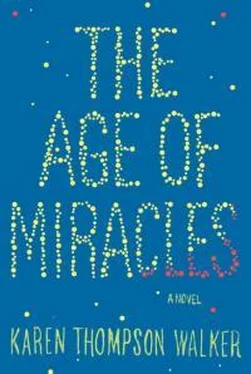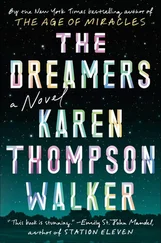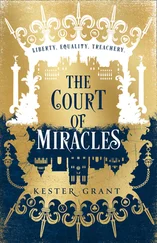My room was dark. The house was quiet.
In a few hours, I’d see Seth at the bus stop, and I wanted to say the exact right thing when I did, to divine whatever the words were that would lead to a second afternoon at his side.
That was when I heard it: a loud crash from outside. I remember the breaking of glass and the screeching of car alarms on the street. I rushed to my window and looked out: The tallest eucalyptus on the street had sliced through Sylvia’s roof and crushed one corner of her house.
Over time, I have come to believe in omens. But I wonder if I might have developed a more strictly rational mind had I lived in a time before the slowing. Perhaps in some other era, science instead of superstition might have sufficed.
My parents rushed outside, my mother in her bathrobe, my father without a shirt. It was a dark night, cloudy, no stars. The tree lay diagonally across the yard, blocking Sylvia’s front door. The roots were exposed, hanging in the air, like a molar wrenched from a gum. One section of Sylvia’s roof had collapsed.
All along the street, lamps flashed on in bedrooms, doors swung open, the voices of neighbors rose from front yards. Sylvia’s house stood dark and silent. Some of the men jogged toward it in pajamas, but my father was first, dashing through the side gate, out of sight. My mother stood with her arms crossed in the middle of the street. I stood beside her, shivering in my nightgown.
“She should have had that tree cut down,” said my mother.
Two of ours had been removed already. There were stumps all over the neighborhood, and crews of men in reflective suits worked constantly along the roads, felling trees one by one and then carting the pieces away.
“We should cut the rest of ours down, too,” said my mother.
She took a few steps closer to Sylvia’s house, stood on tiptoes, angling for a better view.
“Where is he?” she asked.
I used to think my mother knew at least as much as I did about Sylvia and my father and that every question she asked was code for something else. But maybe she only sensed it.
She kept her own secrets too. She was hiding a massive new store of emergency supplies in the closet of the guest room. She was hoarding hundreds of cans of food and hiding them from my father. And she had placed an order for a greenhouse without telling him.
Finally, my father emerged through the side gate. Sylvia was with him, draped over his shoulder but walking, barefoot in a short white nightgown.
My father guided her to our porch, where she sat with her head in her hands.
“She’s okay,” he said. “She’s just shaken up.”
My mother brought her a glass of water, though she kept her distance as she handed Sylvia the glass.
Sylvia’s nightgown left her whole back exposed. In the front, the shape of her small breasts was apparent through the thin cotton. She sat for a long time, hunched on our steps like a girl. You see only a few adults cry the way she did on that night, open, abiding, unashamed.
“It hit the piano,” my father said softly.
“This was not an accident,” said Sylvia, wiping her nose with the back of her hand.
The other neighbors had trickled back into their houses. The lights were switching off. It was five in the morning on a dark night.
“The tree was sick,” said my father.
“No,” said Sylvia. She shook her head. She had the thinnest, most swanlike neck. The knobs of her spine surfaced as she turned her neck. “Someone did this.”
Sylvia was the last real-timer left on our street. The Kaplans were gone. Tom and Carlotta were gone; a young family had moved into their house and begun remodeling.
“I’m telling you, Joel,” said Sylvia. The way she said my father’s name was not the way one neighbor speaks another neighbor’s name. My mother heard it, too. She glanced at my father and pulled her bathrobe closed at the neck. Sylvia continued: “They’re trying to drive me out.”
Later, I tried but mostly failed to sleep the last hour before my alarm clock sounded. Meanwhile, my parents argued through their bedroom door. I could hear not what was said but what was expressed, the anger radiating through the door.
It was tradition among the girls at my school to bring each other a balloon on the day of each girl’s birth. It was always the same variety of balloon, the shiny Mylar kind you buy at the party store. You carried it around with you all day or fastened it to your backpack, letting it float behind you, fat and lovely, through math, English, life sciences, PE. Weighted by a tiny beanbag, each balloon bobbed above the sea of heads in the halls, a buoy marking the precise location of a happy and well-liked girl. This tradition had not been interrupted by the slowing.
The year before, Hanna had brought my balloon—but that was a past life, or someone else’s, an earlier, uncomplicated spring.
I tried not to look at Hanna that morning at the bus stop, the way she was sitting against the fence, her phone pressed hard to her ear. She didn’t even say hello.
This year I knew my birthday would go unmarked at school.
I stood at the edge of the crowd at the bus stop, waiting in the darkness for Seth to arrive. I had spent a long time choosing what to wear, settling finally on the cream mohair sweater I’d worn for picture day and a knee-length jean skirt.
The stars glowed. Headlights flashed. Kids trundled in on foot from various directions. Some emerged from the passenger sides of running cars, backpacks swinging from their arms. Seth was not among them.
Minutes passed. I began to shiver.
I shifted my weight from one foot to the other and then discovered, to my horror, that the hairs on my legs were glittering under the streetlights. I was suddenly embarrassed standing there, just a few feet away from Michaela’s smoothly shaved calves, which were right at that moment standing attractively in a pair of heeled black sandals as she laughed into the ear of one of the eighth-grade boys.
Finally, there came the sound of plastic wheels grinding asphalt in the distance, the rattle of a board scraping the curb. My heart began to race. There he was: Seth Moreno.
He stepped off his board. He tucked it under one arm.
I wanted to tell him that I’d heard about another group of whales beached a few miles farther up the coast. But I wasn’t sure how to start. This was new to me, the special communications that tethered boys to girls.
The bus heaved up to the curb, and kids began to climb the stairs, but I lingered on the pavement, waiting for Seth to show me how things would be. Our eyes met. Seth nodded slightly.
I’d been rehearsing this moment for hours, and I had outlined a hundred different scenarios. Mr. Jensen once tried to tell us that there existed somewhere a set of parallel universes, unreachable but real, where every possibility came true; whatever didn’t happen here happened somewhere else, each option unfolding in a separate universe. But in this one world, at least, the outcome that morning was reduced finally to just this one version.
Seth stood on the sidewalk for a moment, averting his eyes from me. He didn’t smile. He didn’t speak. Then he walked right past me and kept going, as if the two of us were strangers. He stepped onto the bus and didn’t look back.
I don’t know how much time passed after that—thirty seconds, maybe longer—but I became aware eventually of the bus driver yelling down at me from his seat.
“Hey you,” he called over the hum of the engine. “Are you coming?” All the other kids were on the bus by then. A few were staring down at me through smudged windows, snickers forming on their faces. I was a girl standing alone in the dirt in a cream mohair sweater and a stupid jean skirt. It was hard to breathe.
Читать дальше












